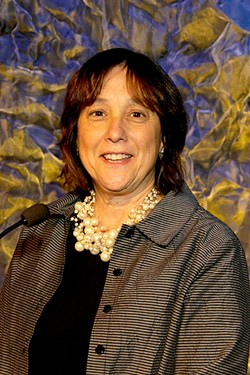
- Courtesy EPA
- Ellen Gilinsky
On a quick stopover in Vermont, officials with the U.S. Environmental Protection Agency this week made the case for a proposed rule which — depending on who you ask — could either "clarify" or "extend" the jurisdiction of the landmark 1972 Clean Water Act.
It's spurred a national debate about the EPA's role in governing waters and preventing pollution. Under
the proposed rule, which is open for formal public comment until October 20, the EPA argues that the Clean Water Act applies to more than just major rivers and streams. The proposed rule would clarify that seasonal and rain-dependent streams, as well as wetlands near rivers and streams, would be protected under the Clean Water Act, and as such be subject to regulation for pollution and quality standards.
"We want to ensure that the whole system, from the headwaters down to the mouth, is protected," said Ellen Gilinsky, the senior water advisor for the EPA, during a site visit on Wednesday morning. In boots and rain gear, Gilinsky and other delegates from EPA offices in D.C. and Boston looked on as a soil conservationist with the Natural Resources Conservation Service led a tour of a restored wetland in Leicester. An NRCS easement turned the former agricultural land along the Otter Creek back into a functioning flood plain.
The so-called "Waters of the U.S." rule wasn't a hot topic of debate during the morning field trip — but it had been the night before, during a roundtable discussion at the University of Vermont.
The EPA contends that the new rule would reduce confusion by clarifying what bodies of water the Clean Water Act governs. They're not expanding jurisdiction or broadening coverage of the act, according to an
EPA website about the proposed rule — though that's exactly what critics have alleged. Last week a group of 30 Republican U.S. Senators introduced legislation to stop the proposed rule, which critics have called a "power grab."
"The Obama EPA is trying every scheme they can think of to take control of all water in the United States," Sen. John Barrasso, R-Wyo,
said in a press statement. "This time, their unprecedented federal water grab is in the form of a rule that will hurt family farms, ranches, and small businesses by imposing outrageous permitting fees and compliance costs."
Opposition to the new rule has been staunch in many agricultural communities — including those close to home. Both the American Farm Bureau Federation and their Vermont chapter, the Vermont Farm Bureau, "categorically oppose" the proposed rule, according to VFB legislative director Bill Moore.
Moore was in the room on Tuesday when the EPA visitors met with representatives from the farm community, Vermont's golf course association, local watershed groups, and Lake Champlain advocates. Farmers are worried about the new rule, Moore said, because it could impact wetlands and seasonal waterways on their land. Moore argued that the proposed rule is a run-around of Supreme Court cases that reaffirmed limits on federal jurisdiction of the Clean Water Act to "navigable" waters.
Gilinsky disagreed with Moore's assessment; she said that farmers have long enjoyed exemptions from "almost everything in the Clean Water Act," and that won't be changing under the new rule. "It really, to be honest, is not going to have much of an effect [on farmers]," said Gilinsky, noting that the EPA is instead interested in "voluntary" approaches to help farmers protect water quality — including cover crops, better manure management and other practices to reduce runoff.
According to the EPA, the proposed rule, if adopted, would increase the national area covered by the Clean Water Act by about 3 percent.
"Historically, the agricultural community hasn't liked regulations," Gilinsky said, swatting at a mosquito on the shore of Otter Creek. Given that, she said, it's understandable that the proposed rule has drummed up concern. "They're interested, and concerned, but there's a lot of misunderstanding of what we're doing."
A Push for More State Regulation
Coincidentally, on the same day EPA officials were visiting Vermont, the Vermont chapter of the Conservation Law Foundation filed a petition with the Agency of Natural Resources requesting state regulators enforce Clean Water Act standards that CLF contends are now being ignored.
In particular, CLF wants the state to crack down on developers such as big box stores, car dealerships shopping centers; CLF senior staff attorney Anthony Iarrapino said the state has already documented that runoff from these kinds of developments contribute significant amounts of phosphorous to their watersheds.
ANR has 90 days to respond to the petition. If the agency denies CLF's request, Iarrapino said, the next step would be to go to the courts — not the EPA.
Iarrapino said that the waters that CLF is pushing the state to better protect are "undeniably" covered under the Clean Water Act.
"While we very much applaud the EPA's effort to extend the Clean Water Act protections to all the waters that should be protected by the law ... there's an even more pressing problem," said Iarrapino. "Once you decide that waters are under the EPA's jurisdiction, then what are you going to do about it?"












Comments
Comments are closed.
From 2014-2020, Seven Days allowed readers to comment on all stories posted on our website. While we've appreciated the suggestions and insights, right now Seven Days is prioritizing our core mission — producing high-quality, responsible local journalism — over moderating online debates between readers.
To criticize, correct or praise our reporting, please send us a letter to the editor or send us a tip. We’ll check it out and report the results.
Online comments may return when we have better tech tools for managing them. Thanks for reading.